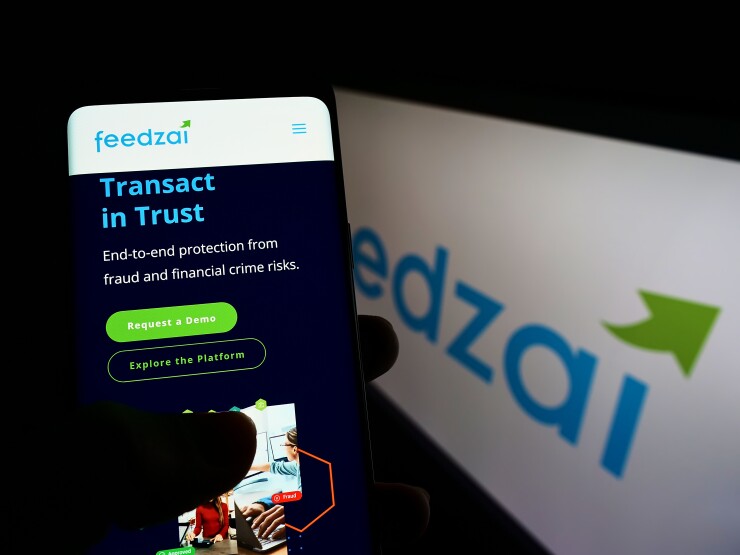- Key insight: The European Central Bank is building a centralized fraud detection system to support payment providers and secure every digital euro transaction.
- What's at stake: Establishing widespread user trust and security in a potential digital euro is paramount for digital euro adoption and success.
- Forward look: Development of the newly awarded functions is expected to take approximately two years, after which a phased rollout will begin.
Overview bullets generated by AI with editorial review
Europe's central bank announced Thursday it had selected several key vendors to develop components for its planned digital euro, a significant step in its project to launch a central bank digital currency, or CBDC.
Among
Per the agreement, Feedzai and its subcontractor PwC will build a real-time service that receives a payment request from a payment service provider, or PSP, and returns, in real time, a risk score calculated using AI-driven analysis of data that is available at the infrastructure level — far richer than the risk data an individual PSP can access.
Feedzai will also provide fraud statistics generated post-transaction to produce reports for PSPs that provide a more holistic view of their fraud risk.
The agreement between ECB and Feedzai has an estimated value of close to $92 million and a maximum value of $278 million, according to the central bank.
Capgemini's bid to provide the central fraud management service ranked second. While the ECB directs initial service requests to the first-ranked provider for a service, the second-ranked provider serves as a backup option.
Augmenting payment service providers' defenses
The ECB structured the digital euro as a two-tier model, meaning commercial banks and other PSPs will handle distribution to end users. This is similar to the current ecosystem for handling money.
Per the agreement, Feedzai's platform will provide payment service providers with insights on patterns and anomalies derived from a central infrastructure-level view.
For every peer-to-peer or peer-to-merchant transaction, the central platform will calculate a fraud risk score in real time. PSPs will be required to use this calculated risk score alongside their own controls when determining whether to approve or decline a payment.
This function will augment activities at the PSP by providing crucial information that PSPs might not otherwise access to support their fraud prevention activities.
Furthermore, under the agreement, Feedzai will perform ex-post fraud analysis based on a holistic picture of transactions across multiple PSPs to help providers detect fraudulent transactions that have already been settled.
Feedzai CEO Nuno Sebastião said that success for the service depends on "AI that can adapt as quickly as fraud evolves" to ensure trust in digital euro transactions.
The initial contract duration covers four years, with options for extensions up to 15 years due to the complexity and expected lengthy rollout period.
Contracts awarded across four other functions
Besides the agreement with Feedzai, the ECB signed framework agreements with providers for four other major functions that will support the digital euro.
The awarded contracts span the following functionalities:
Alias lookup: This component supports PSPs by providing a lookup function that allows end users to identify the necessary details to route a payment using an alias (such as a phone number or email address) instead of traditional account numbers.
Using aliases is designed to improve the user experience and reduces fraud risks in peer-to-peer, or P2P, transfers.
Publicis Groupe, a French advertising company that also provides a wide range of consulting services, ranked first for the bid to provide this service while Worldline, a French payment service, ranked second.
Offline solution: The offline solution includes engineering and development services to provide an offline, hardware-based bearer payment instrument.
Giesecke+Devrient, a German security technology company, ranked first. The ECB expects to announce the second-ranked vendor later in October 2025. The maximum value for this service agreement is $776 million, the largest of the five components announced.
App and software development kit: This service consists of the digital euro app itself and an SDK that supports PSPs in integrating digital euro services into their existing mobile apps and online interfaces.
Almaviva, an Italian technology services provider, ranked first, and Publicis Groupe ranked second.
Secure exchange of payment information: This service supports the tokenization and detokenization (using QR codes or hyperlinks) of transactional and sensitive information, such as transaction amount or payment instrument.
Senacor, a German consultancy focused on digital banking and automotive services and products, ranked first, and Wordline ranked second.
Digital euro remains in preparation phase
The preparation phase for the digital euro launched in November 2023 and
The ECB said it has engaged roughly 70 market participants via an innovation platform to conduct technical tests of features like conditional payments and explore use cases.
The ECB governing council will make a decision to issue the digital euro only if the European Union's legislative process regarding the digital euro regulation has been completed.
The






